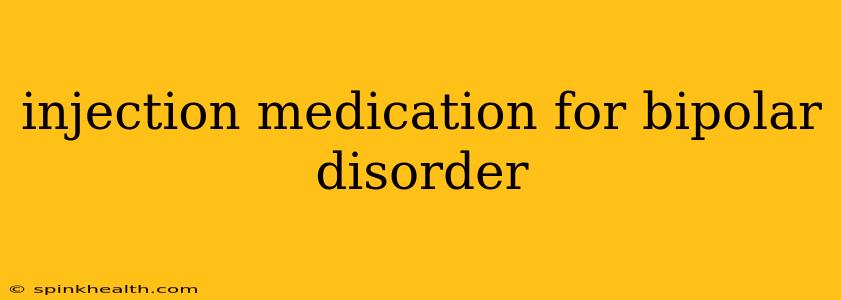Bipolar disorder, a chronic mental illness marked by extreme mood swings, can significantly impact a person's life. While various treatments exist, some individuals find relief through injection medications. This isn't a one-size-fits-all solution, and finding the right medication and delivery method requires close collaboration with a psychiatrist. Let's delve into the world of injectable medications for bipolar disorder, exploring their uses, benefits, and potential drawbacks.
What are the different types of injection medications for bipolar disorder?
Several injectable medications can effectively manage bipolar disorder symptoms, primarily focusing on managing manic or depressive episodes. These generally fall into two categories: antipsychotics and mood stabilizers. While not all mood stabilizers or antipsychotics are available in injectable form, some are crucial for managing acute episodes.
Antipsychotics:
Many antipsychotics, both typical and atypical, are available as injections. These are often used to rapidly stabilize acute manic or psychotic episodes characterized by severe agitation, delusions, or hallucinations. The injectable form allows for quicker symptom control than oral medications.
Mood Stabilizers:
Some mood stabilizers, such as certain formulations of anticonvulsants, are also available as injections. These may be used to prevent mood swings or to address severe episodes. The choice will depend on individual needs and the specific symptoms being experienced.
What are the benefits of injection medication for bipolar disorder?
Injectable medications offer several advantages, particularly in situations where oral medication isn't effective or feasible:
- Rapid Symptom Relief: Injections deliver medication directly into the bloodstream, leading to faster symptom improvement compared to oral medications. This is particularly crucial during severe manic or depressive episodes.
- Improved Compliance: For individuals who struggle with adherence to oral medication regimens, injections can provide a consistent and reliable treatment strategy, ensuring the patient receives the prescribed dosage.
- Management of Acute Episodes: Injections are invaluable for managing acute exacerbations of bipolar disorder, quickly stabilizing symptoms and preventing hospitalization.
- Long-Acting Injections: Some medications are available as long-acting injectable formulations. These injections provide sustained medication levels over weeks or months, minimizing the need for frequent injections and enhancing adherence.
What are the potential side effects of injection medication for bipolar disorder?
Like all medications, injectable treatments for bipolar disorder can have side effects. These vary depending on the specific medication and the individual. Common side effects may include:
- Weight gain: This is a common concern with some antipsychotic medications.
- Sedation or drowsiness: Some individuals experience increased fatigue or drowsiness.
- Extrapyramidal symptoms (EPS): These are movement disorders, such as tremor, rigidity, or involuntary muscle movements.
- Metabolic changes: Some medications can affect blood sugar and cholesterol levels.
- Injection site reactions: Pain, redness, or swelling at the injection site is possible.
Are injection medications for bipolar disorder right for me?
The decision to use injectable medication for bipolar disorder is a collaborative one between the patient and their psychiatrist. Several factors are considered:
- Severity of symptoms: Injections are often reserved for individuals experiencing severe or acute episodes.
- Medication history: Past responses to oral medications and adherence to treatment regimens are important factors.
- Individual preferences: Patient preferences and comfort levels with different treatment approaches are vital considerations.
- Potential side effects: The psychiatrist will weigh the potential benefits against the risks of side effects for each individual.
What should I expect during treatment with injection medications?
Treatment with injectable medication involves regular monitoring and follow-up appointments with a psychiatrist or mental health professional. This allows for close observation of the treatment's effectiveness and adjustment of medication as needed. Regular blood tests may be necessary to monitor for side effects.
How long does it take to see results from injection medication for bipolar disorder?
The timeframe for seeing results varies depending on the medication and the individual. Some individuals may experience symptom improvement within hours or days, while others may see a gradual improvement over several weeks. Consistent treatment is key to achieving long-term stability.
This information is for educational purposes only and should not be considered medical advice. Always consult with a qualified healthcare professional for diagnosis and treatment of bipolar disorder or any other medical condition. They can provide personalized guidance based on your specific circumstances and medical history.

